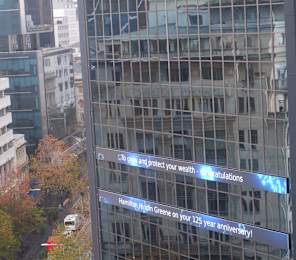Stock markets in the US and Europe were weaker as investors digested the cloudy outlooks proffered by central bankers, who are grappling with the uncertainty posed to the global trading system by US President Donald Trump’s tariff regime.
The Bank of England kept its key interest rate at 4.5% and warned that the escalating trade tensions made things too uncertain to assume it will continue cutting rates, while European Central Bank president Christine Lagarde said the tit-for-tat tariffs will likely boost inflation in the short-term.
The Swiss National Bank cut its key rate, while also noting the heightened uncertainty, and Sweden’s Riksbank kept its policy unchanged, describing the global developments as dramatic.
Wall Street had taken heart from the US Federal Reserve chair Jerome Powell yesterday saying inflation from the tariff war might be transitory, but that was unwound on Thursday as the S&P 500 slipped 0.3%. European markets were broadly weaker, with the UK’s FTSE 100 declining 0.1% and Germany’s DAX 30 unwinding recent gains as it fell 1.2%.
“We thought Powell might have avoided that word, given the Fed’s view of inflation being transitory during the covid episode proved to be wrong, but the market seems to be buying into the narrative,” Bank of New Zealand senior market strategist Jason Wong said in a note.
The kiwi dollar ran out of puff, falling to 57.49 US cents at 7am in Auckland from 57.96 cents yesterday.
One swallow does not a summer make
Statistics New Zealand figures yesterday showed the domestic economy grew faster than economists had expected, although BNZ’s Wong cautioned against reading too much into the data.
“Market reaction was rightly fleeting in the rates and currency market, given the volatility in the data,” Wong said. “Here we are one quarter later and the vibe is one of a cautious recovery in activity than solid growth.”
Bitcoin slipped 1.6% to US$84,078 after Trump told a crypto conference he wants the US to be the “undisputed bitcoin superpower and the crypto capital of the world”, echoing comments he made at a White House summit two weeks ago.
The downbeat tone is expected to carry over to the antipodes, with Australian futures pointing to a 0.2% decline for the S&P/ASX 200 index, while local data include February trade figures.
And Foley Wines’ owner Bill Foley is coming under pressure from investors in his US holding company Cannae to shake up his board and sell investments in public stocks to focus on its private holdings, such as European soccer teams, the Wall Street Journal reported. Foley owns the Auckland FC club in New Zealand.
Meanwhile, in the US a deal has been cut to sell the Boston Celtics basketball franchise for US$6.1 billion, record price among pro sports.
Reporting by Paul McBeth. Image from Alicja Ziajowska on Unsplash.










